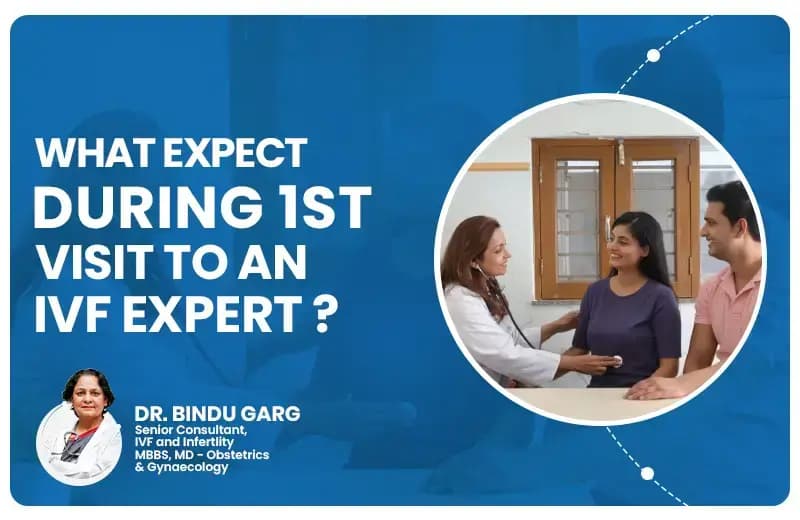
What You Expect During 1st Visit To An IVF Expert
Preparing for your initial visit to an IVF expert is a significant step in your fertility journey. This comprehensive guide will walk you through each aspect, providing a clear understanding of what awaits. From understanding the role of the expert to addressing common concerns, this article aims to prepare you for this vital consultation.
Understanding the Initial Consultation
During the initial consultation for IVF, the fertility specialist collects important information about your medical history, previous fertility treatments, and lifestyle factors. This session sets the foundation for your personal fertility journey. Bring all relevant medical records, be prepared to discuss your menstrual cycle and previous pregnancies, and prepare questions about the IVF process. This consultation usually lasts one to two hours, allowing the specialist to comprehensively assess your condition. This is an important step toward developing a customized treatment plan, addressing your concerns, and guiding you on your path to parenthood.
How long is an initial consultation?
The initial consultation usually takes about 30 to 60 minutes. It's a meeting where you talk to a professional, like a doctor or a lawyer, to discuss your needs or concerns. They'll ask questions and listen to you to understand your situation better. This helps them provide the right advice or solution. So, if you have an initial consultation, be ready to share information and ask any questions you might have. It's like a first conversation to figure out how they can help you best.
Tips for the Initial Consultation
- Bring all of your medical records and test results.
- Prepare questions on IVF process, risks, and success.
- Inquire about IVF costs and financing options.
- Research the clinic's success rates for informed decisions.
- Know the IVF stages: stimulation, retrieval, fertilization, transfer, implantation.
- Discuss potential IVF risks and coping strategies.
- Explore lifestyle changes to increase fertility.
- Be prepared for fertility tests and medical examinations.
- Clear follow-up appointments and monitoring schedules.
- Find emotional support; Fertility treatment can be challenging.
Fertility Assessment and Testing
After the initial consultation, fertility evaluation and testing usually includes laboratory tests such as blood tests and semen analysis, imaging tests such as ultrasound of the reproductive organs and other procedures to test the functioning of the reproductive system. Men's tests include a physical examination that includes examination of the genitals, semen analysis, hormone testing, genetic testing, testicular biopsy, imaging, and other tests. Tests for women include ovulation tests, thyroid function tests, hysterosonography, hysteroscopy and other tests.
After completing the testing, you'll schedule a follow-up appointment with your doctor to discuss the results and make a plan for fertility treatment. It is important to note that infertility testing can involve uncomfortable procedures and can be expensive. There is no guarantee that one will get pregnant even after all the tests and consultation.
Importance of Fertility Testing
- Identify underlying issues.
- Tailored Treatment Plans.
- Timely intervention.
- Reduce emotional stress.
- Maximize Success Rate.
- Know male and female factors.
- Optimum time for conception.
- Guide to Lifestyle Modifications.
- Manage Expectations.
- Stop unnecessary treatment.
- Facilitate informed decision making.
Discussing About IVF Treatment Options
Following the availability of test results, your IVF specialist will engage in a detailed discussion regarding personalized treatment plans tailored to your specific circumstances. Options may include traditional IVF, intracytoplasmic sperm injection (ICSI), or other cutting-edge reproductive technologies.
By looking at the pros and cons of each option, your fertility specialist's goal is to equip you with complete knowledge, facilitating the process of making an informed decision. This collaborative approach ensures that the treatment chosen seamlessly aligns with your individual needs, maximizing the chances of a successful outcome in your fertility journey.
Consider IVF Treatment Options
- Success rates of different procedures.
- Evaluate the different IVF treatment options available.
- Discuss traditional IVF as a possible option.
- Explore intracytoplasmic sperm injection (ICSI) possibilities.
- Consider other advanced reproductive technologies.
- Assess the advantages and disadvantages of each treatment option.
- Join a detailed discussion with a fertility specialist.
- Ask for clarification on the intricacies of different approaches.
- Aim for a comprehensive understanding of the possible outcomes.
- Make sure the treatment chosen suits the individual circumstances.
- Collaborate with a fertility specialist to make informed decisions.
- Emotional and financial implications of each treatment.
Developing a Personalized Treatment Plan
After talking to you about how to help you have a baby, your IVF specialist will make a special plan for you. This plan shows the exact things you need in your journey to having a baby, such as medications and steps. It's really important to know when things will happen, the potential side effects and how much time you need for the IVF treatment to work. Planning helps you see what to expect and how much effort it will take for the treatment to be successful. So, this is like a guide to help you understand and prepare for your particular plan of having a baby.
Components of a Treatment Plan
- Initial consultation: Discuss reproductive history.
- Ovarian stimulation: Medicine to produce many eggs.
- Egg retrieval: Surgical procedure to collect eggs.
- Sperm collection: Sperm from the partner or donor is used.
- Fertilization: Mix the egg and sperm in a laboratory.
- Embryo transfer: Place the embryos into the uterus.
- Pregnancy test: Confirm success.
The Role of Emotional Support
Starting fertility treatment can be emotionally difficult. Many people need support during this time. Your IVF specialist may suggest talking to a counselor or joining a support group. These things can help you deal with the emotions that come with fertility treatment. It's okay to feel overwhelmed, and getting support can make it easier. Don't be afraid to ask for help or talk about how you feel.
Importance of Emotional Well-being
- Emotional well-being is important for IVF success.
- Reduces stress, increases fertility.
- Positive mindset boosts treatment outcomes.
- Emotional support is important during the IVF journey.
- Improves overall health during pregnancy.
- Counseling and Mindfulness Assistant.
- Emotional balance helps deal with challenges.
- Prioritize mental health for a successful IVF experience.
Conclusion
Your first visit to an IVF expert marks the beginning of a hopeful journey toward parenthood. Understanding what to expect during this initial consultation, fertility testing, and treatment planning can empower you to make informed decisions. Remember, each fertility journey is unique, and the support of your IVF expert and your emotional well-being are crucial aspects of the process.
5 Engaging FAQs About the First IVF Visit
Q1. What happens during an initial consultation?
During the first meeting, you and the specialist discuss your needs. They ask questions to better understand your situation. This helps them plan to help you effectively.
Q2. Do I need to make lifestyle changes before starting IVF treatment?
Yes, consider adjusting your lifestyle before starting IVF. Eat healthy, get moderate exercise, and manage stress. Avoid smoking and excessive alcohol. Consult your doctor for individual advice.
Q3. What factors contribute to the success of IVF treatment?
Success in IVF depends on factors such as age, health and fertility issues. A woman's age greatly affects the results. Good overall health and resolution of specific fertility challenges also contribute to success.
Q4. Is IVF the only option for infertility?
No, IVF is not the only option for infertility. Depending on the cause, other treatments such as medication, surgery or lifestyle changes may be considered before or instead of IVF.
Q5. Are there any signs that IVF has worked?
Signs that IVF is working include a positive pregnancy test, missing periods, and early pregnancy symptoms such as nausea or breast tenderness. A doctor can confirm success through ultrasound and blood tests.
Content Created By:

CyberBizz Technologies
Team - Content Curator